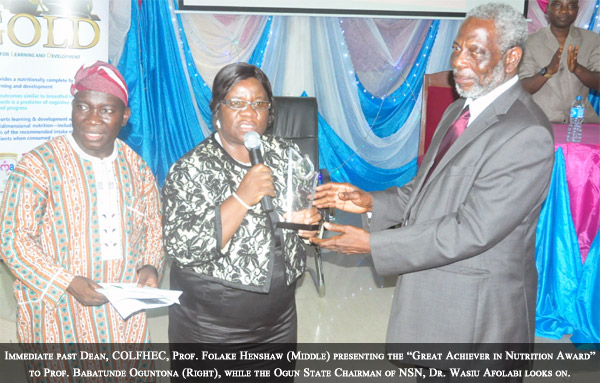
The Nutrition Society of Nigeria, Ogun State Chapter, recently met in the University to discuss on how to enhance better healthcare for the people through the consumption of healthy food, during its 2015 Annual Symposium titled, “Nutrition Transition and the Health of Nigerians”.
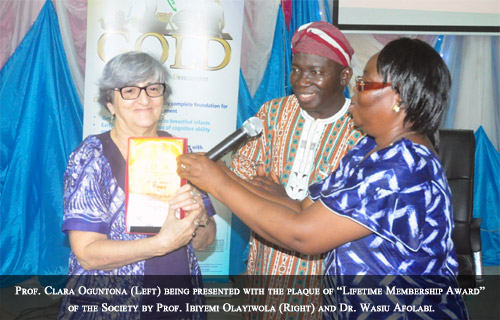
Welcoming participants, Dr. Wasiu Afolabi, the Chapter Chairman of the Society, who is also the immediate past Deputy Dean, College of Food Science and Human Ecology (COLFHEC) of FUNAAB, appreciated the unalloyed support given by the Vice-Chancellor, Professor Olusola Oyewole, the University Management and corporate sponsors such as Wyteh Nutritio, Coca-Cola Bottling Company (Nig.) Plc, Dufil Prima Foods (Nig.) Limited and Nestle Plc, among others. He noted that the Chapter was the first to be inaugurated eight years ago and it had been a yearly tradition of the Society to organise an annual event in a bid to fulfilling its mandate.
Dr. Afolabi added that this year’s theme was unique because of the contemporary issues discussed that bordered on the prevalence of diet and nutrition-related diseases such as diabetics, stroke, cancer and heart diseases, which had the tendency of hindering the nation’s economic development. He added that the programme was held to recognize and appreciate the efforts of the Society’s founding fathers, fulfill its set objectives and co-operate with Universities, research institutes and similar bodies for the exchange of professional information on the promotion of human nutrition.
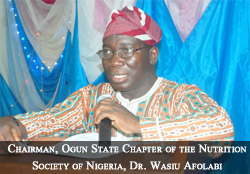
While presenting his paper titled, “Dietary Acculturation and Nutrition Transition in Nigeria”, Professor Babatunde Oguntona, defined acculturation as the process by which immigrants adopt the attitudes, values, customs, beliefs, and behaviours of a new culture while dietary acculturation is the process by which immigrants adopt the dietary practices of their host country. Professor Oguntona described nutrition transition as the shift in dietary consumption and energy expenditure that coincides with economic, demographic, and epidemiological changes. He, therefore, advised members of the public to reduce the quantity of red and processed meat being consumed so as to reduce total mortality rate and cancer cases by recommending the consumption of white meat.
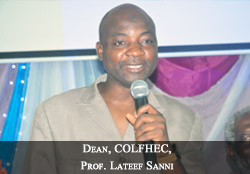
Presenting his paper titled, “Non-Communicable Diseases in Nigeria”, Dr. Ajani Sanusi, Faculty of Public Health, University of Ibadan, said non-communicable diseases accounted for 63 percent of all deaths globally, as 80 percent of such deaths occur in low/middle income countries while more than 90 million of the deaths happened before the age of 60 years. He highlighted some common non-communicable diseases in Nigeria to include cancers, diabetics, cardiovascular disease, chronic respiratory disease, among others.
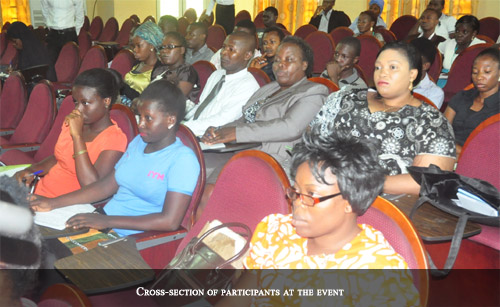
He suggested the following in the prevention and management of the diseases: government policy and plan of action, available health services, accessible and adequate private/public health insurance, research and documentation as well as the provision of enabling environment. He, therefore, charged the participants to be mindful of what they eat and be conscious of their environment. The programme was rounded-off with the presentation of the “Lifetime Membership Award” to Professor Clara Oguntona and the “Great Achiever in Nutrition Award” to Professor Babatunde Oguntona while Professor Lateef Sanni, the Dean, College of Food Science and Human Ecology (COLFHEC), appreciated the keynotes speakers for attending the symposium.
Last Updated on November 14, 2015 by admin
